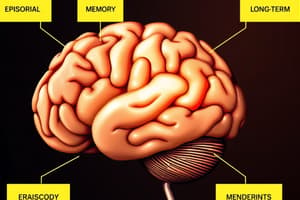Podcast
Questions and Answers
Which of the following best describes the concept of a prototype in prototype theory?
Which of the following best describes the concept of a prototype in prototype theory?
- A mental representation of an object based on its most typical characteristics (correct)
- A blueprint or design plan for creating new objects
- A set of rules for categorizing objects based on their features
- A physical model used for testing and experimentation
What is the primary function of algorithms in problem-solving?
What is the primary function of algorithms in problem-solving?
- To encourage creative and flexible thinking
- To break down problems into smaller subgoals
- To provide a fixed set of rules that, if followed correctly, will lead to a solution (correct)
- To utilize analogies from previous experiences
Which of the following is NOT a characteristic of heuristics in problem-solving?
Which of the following is NOT a characteristic of heuristics in problem-solving?
- They are rules of thumb or mental shortcuts
- They guarantee an optimal solution every time (correct)
- They allow for quick and easy problem-solving
- They reduce the number of operations required to solve a problem
What is the availability heuristic in problem-solving?
What is the availability heuristic in problem-solving?
Which of the following is NOT one of the three strategies for problem-solving mentioned in the text?
Which of the following is NOT one of the three strategies for problem-solving mentioned in the text?
In the context of problem-solving, what does it mean to change one's mental set?
In the context of problem-solving, what does it mean to change one's mental set?
What is the purpose of using analogies in problem-solving?
What is the purpose of using analogies in problem-solving?
Which of the following best describes the process of forming subgoals in problem-solving?
Which of the following best describes the process of forming subgoals in problem-solving?
Which of the following statements about heuristics is NOT true?
Which of the following statements about heuristics is NOT true?
What is the primary advantage of using algorithms in problem-solving?
What is the primary advantage of using algorithms in problem-solving?
Flashcards are hidden until you start studying
Study Notes
Long-Term Memory
- Refers to the process of storing large amounts of information over a long period with the potential of retrieving it in the future.
Level of Processing Theory
- States that remembering depends on how information is encoded, with deeper encoding resulting in better recall.
Flashbulb Memories
- Clear and detailed reconstructions of events that are surprising, important, and emotionally stirring.
Memory Phenomena
- Tip-of-the-tongue phenomenon: feeling of knowing information but being unable to recall it.
- Context-dependent memory: information is better retrieved in the context in which it was encoded.
- State-dependent memory: information is better retrieved in the physiological or emotional state in which it was encoded.
- Photographic memory: ability to form sharp, detailed visual images after brief exposure and recall them later.
Reasons for Forgetting
- Repression: mental process that hides emotionally threatening or anxiety-producing information in the unconscious.
- Poor retrieval cues/poor encoding: failure to create vivid mental images or associations leads to forgetting.
- Interference: recall of a particular memory is blocked or prevented by other related memories.
- Proactive interference: old information blocks or disrupts the remembering of related new information.
- Retroactive interference: new information blocks or disrupts the retrieval of related old information.
- Amnesia: temporary or permanent loss of memory due to brain damage, disease, anesthesia, or physiological trauma.
Thinking and Cognition
- Refers to the mental activity of organizing, understanding, and communicating information.
Forming Concepts
- A concept is a way to group or classify objects, events, animals, or people based on shared features or characteristics.
- Exemplar model: forming a concept by defining essential characteristics of a particular thing.
- Prototype theory: creating a mental image of an object, event, animal, or person by matching it to a prototype.
Problem Solving
- Involves searching for a rule, plan, or strategy to achieve a goal.
- Algorithms: fixed set of rules that lead to a solution if followed correctly.
- Heuristics: rules of thumb or creative mental shortcuts that reduce operations and allow for easy problem-solving.
- Availability heuristics: relying on prominent or easily recalled information and overlooking other available information.
Strategies for Problem Solving
- Changing one's mental set.
- Using analogies: finding similarity between new and old situations.
- Forming subgoals: breaking down problems into separate parts.
Studying That Suits You
Use AI to generate personalized quizzes and flashcards to suit your learning preferences.




